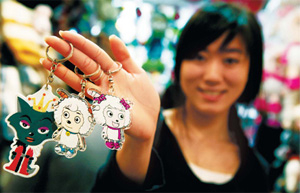Foreign and Military Affairs
Royal audience sign of warmer ties with Japan
By Ai Yang (China Daily)
Updated: 2009-12-12 09:59
The relationship between China and Japan warmed significantly this week, with prominent political figures from both nations eager to pay high-profile visits to each other's country.
But experts cautioned there may still be roadblocks ahead en route to even closer ties.
China announced Friday that Vice-President Xi Jinping will meet Japanese Emperor Akihito during Xi's visit to Japan next week.
The news came as Ichiro Ozawa, former leader of the Democratic Party of Japan (DPJ), met with Chinese Defense Minister Liang Guanglie in Beijing.
Kyodo News reported that the emperor will grant an exceptional audience to Xi, even though Beijing's request for such a visit was not made with sufficient advance warning.
| ||||
Chief Cabinet Secretary Hirofumi Hirano said yesterday the government asked the emperor to meet Xi because of the importance of bilateral relations.
Sources said Ozawa, the influential right-hand-man in Yukio Hatoyama's party, telephoned the prime minister about the issue on Tuesday.
"The exception made by the Japanese government says it regards its counterpart highly," said Liu Jiangyong, a senior analyst on Asia-Pacific studies at Tsinghua University. "In Japan, people hold different views toward the Hatoyama government, but it won't stop the trend of the two countries strengthening their relationship."
But observers said the road ahead may not be smooth.
DPJ Secretary-General Ichiro Ozawa expressed concern about what he saw as China's military buildup during his meeting with Defense Minister Liang, according to Kyodo News.
The secretary-general said China's military capacity was modernizing and expanding and the "China threat" theory had emerged in Japan.
Liang reassured Ozawa that China's military will only be used to protect its territory and borders.
"China and Japan will not return to another honeymoon phase such as they had in the 1980s," said Gao Hong, deputy head of the Institute of Japan Studies at the Chinese Academy of Social Sciences. "But it will not return to the 'cold politics, hot economy' phase of the 1990s either."
Gao said the relationship will develop in a more practical and stable direction.
"Both sides are growing more mature," said Gao. "We will face problems between us more directly, especially in terms of disputes about sea territory and trade protectionism."
While the relationship between China and Japan has warmed, the bond between the United States and Japan has been strained recently. Japan Today reported on Thursday that the US was "reluctant" to arrange a meeting between US President Barack Obama and Japanese Prime Minister Hatoyama during the Copenhagen Summit.









